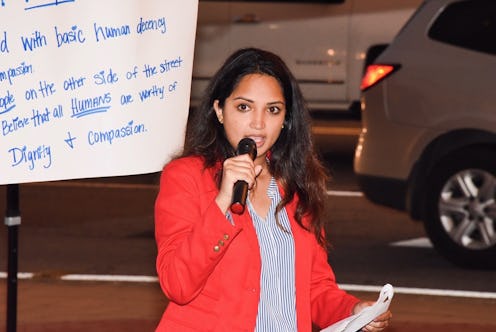Life
Nabilah Islam Is Running For Congress — But She Can’t Afford Health Insurance

Nabilah Islam thought she'd be able to hold a part-time job while running for Congress. She’d left the Democratic National Convention, where she was southern regional director, in 2018 to campaign for Georgia’s 7th congressional district, but that meant she gave up her health care. She quickly realized that running a campaign left her no extra time for a side gig — and she couldn’t afford the $450 a month she paid for insurance on the marketplace. That's why on Jan. 27, she filed a request with the Federal Election Commission (FEC) to use campaign funds to cover the cost of her health insurance. If the FEC approves the request, it would eliminate one of many barriers on the path to elected office.
There are hidden costs of running for office. In 2017 and 2018, congressional candidates reported raising roughly $1.7 billion to pay for their campaigns. The majority of that funding often comes from personal funds, big donors, and political action committees. Islam notes that about 40% of lawmakers in Congress are millionaires, and the average net worth of the body is $500,000 — five times the median U.S. household net worth, according to USA Today. "That's not reflective of America," Islam says. Rep. Alexandria Ocasio-Cortez (N.Y.-14), who was a bartender before winning her seat in 2018, has been transparent about the prohibitive costs of running for office. Shortly after the Midterms, she tweeted that she couldn't afford to rent a Washington D.C. apartment until her Congressional salary kicked in.
Islam has been compared to Ocasio-Cortez because they're both young (Islam is 29, the same age AOC was when she won office) and progressive. Both of them also come from diverse districts. Islam's home district, northeast of Atlanta, is one of the most diverse in the nation, but she says that’s not reflected in its elected officials. "Because we haven't been at the table, we've been on the menu," Islam says. The 7th District has the highest number of deportations in the entire state, she notes; about 17% of the district doesn't have access to health care; and the district has the largest pretrial detention center in the country.
"I really wanted to... advocate for progressive policies that would effectuate real change in our community," Islam says. She supports raising the minimum wage, universal health care, and immigration reform, which includes banning policies like President Trump's travel ban for people from Muslim-majority countries.
Certain campaign-related necessities — like staff wages, office space and supplies, and travel — can be covered by campaign funds, and full-time campaign staff can receive health insurance as part of their salaries. But an FEC law only allows candidates to pay themselves a salary with health care after the primary filing deadline. For Georgia, that's not until March. Islam started her campaign in February 2019, and has been without insurance since November 2019. In order to qualify for Medicaid as a Georgia adult, you need to have children. Islam does not. She’s currently using her savings to pay for rent and food. She’s also put her $30,000 of student loan debt into forbearance, where it’ll continue to accrue interest. "I'm going into more debt to run full time," she says.
The FEC has recently made exceptions for candidates facing financial barriers. Liuba Grechen Shirley, who ran unsuccessfully for New York’s 2nd Congressional District in 2018, petitioned the FEC to use her campaign funds for child care in May 2018. The FEC approved her request, and other candidates have since filed petitions to use funds for child care. “This is how you get working people in office," Grechen Shirley says, referring to her and Islam's petitions.
Grechen Shirley compares campaigning to having three full-time jobs. "To do that with small children is very difficult ... you need to be able to have child care," she says. "There is a reason that we have so few mothers in Congress." She’d attend campaign events with her infant strapped to her chest. If the FEC hadn't approved her request, she might have been forced to suspend her campaign. She remembers meeting candidates who were forced to borrow EpiPens on the trail because they didn't have health insurance, and others who had to take out a second mortgage on their home. "I took money out of my retirement account to live during the campaign," Grechen Shirley says. Islam wouldn't drop out, she says, but she would go without insurance.
According to both women, allowing people to use campaign funds for both child care and health insurance is the first step toward having a Congress that actually represents Americans. "If this ruling goes in my favor, it will unlock the potential of more people like me to run for Congress who will advocate for progressive policy policies like Medicare for All," Islam says. "We would have representation that truly understands the working class."
This article was originally published on